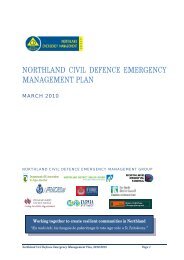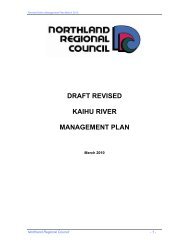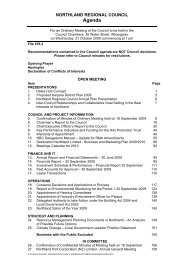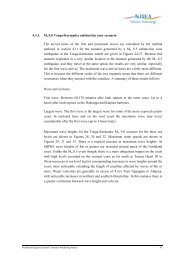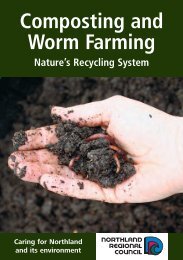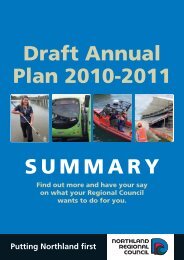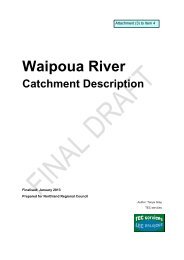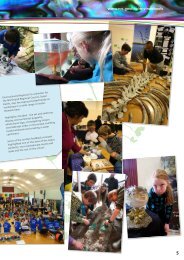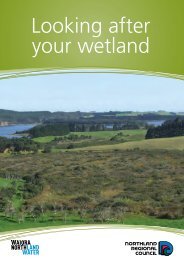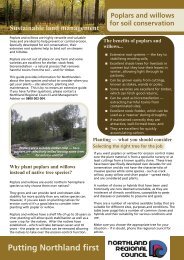The State of the Lakes of Northland - Northland Regional Council
The State of the Lakes of Northland - Northland Regional Council
The State of the Lakes of Northland - Northland Regional Council
You also want an ePaper? Increase the reach of your titles
YUMPU automatically turns print PDFs into web optimized ePapers that Google loves.
9.4 Responses to Issues Affecting <strong>the</strong> <strong>Lakes</strong> <strong>of</strong> <strong>Northland</strong>9.4.1 <strong>Regional</strong> <strong>Council</strong>Policies and Plans<strong>The</strong> <strong>Regional</strong> Policy <strong>State</strong>ment provides an overview <strong>of</strong> resource managementissues in <strong>Northland</strong>, including those with regard to lake water quality and quantity. Itcontains objectives, policies and methods to achieve <strong>the</strong> integrated management <strong>of</strong><strong>Northland</strong>’s environment.<strong>The</strong> objectives <strong>of</strong> <strong>the</strong> <strong>Regional</strong> Policy <strong>State</strong>ment seek to maintain or enhance waterquality <strong>of</strong> <strong>Northland</strong> lakes for <strong>the</strong> purposes <strong>of</strong> aquatic ecosystems, contact recreation,water supplies and cultural and aes<strong>the</strong>tic purposes.<strong>The</strong> Revised Proposed <strong>Regional</strong> Water and Soil Plan contains rules that prohibit<strong>the</strong> discharge <strong>of</strong> any sewage and animal effluent into <strong>the</strong> dune lakes as specified in<strong>the</strong> plan. Closed systems such as dune lakes are more sensitive to <strong>the</strong> adverseeffects <strong>of</strong> effluent discharges. Dune lakes have been recognised as having highrecreational and aes<strong>the</strong>tic qualities and are an important tourist feature <strong>of</strong> <strong>Northland</strong>.Discharges into any <strong>of</strong> <strong>the</strong> dune lakes would threaten those qualities.MonitoringIn April <strong>of</strong> 2001 <strong>the</strong> <strong>Northland</strong> <strong>Regional</strong> <strong>Council</strong> contracted aquatic plant specialistsfrom NIWA to survey twenty-six <strong>of</strong> <strong>the</strong> <strong>Northland</strong> <strong>Lakes</strong>. Aquatic plants were firstsurvey in 1986 and by visiting <strong>the</strong> lakes again, NRC hopes to be able to comparechanges in aquatic plant communities.Aquatic plants can be an indicator <strong>of</strong> overall lake health and many <strong>Northland</strong> <strong>Lakes</strong>are vulnerable to aquatic weed invasion. <strong>The</strong>se surveys will help <strong>the</strong> <strong>Council</strong> toidentify invasions <strong>of</strong> weeds and to take steps to control <strong>the</strong>m if necessary. <strong>The</strong>results will also reveal how <strong>the</strong> lake communities are changing over time. <strong>The</strong> results<strong>of</strong> this survey should be available during 2002.Weed surveys <strong>of</strong> Lake Omapere are expected to continue as long as Egeria remainsa problem in this lake. More information on <strong>the</strong> state <strong>of</strong> Lake Omapere can be foundat http://www.nrc.govt.nz/about.us/special.events/lake.omapere/index.shtmlEgeria spreads vegetatively by plant fragments being transferred between lakes.Fragments on boats and trailers are a primary mode <strong>of</strong> dispersal. <strong>Northland</strong><strong>Regional</strong> <strong>Council</strong> undertakes education and has erected signage at major lakesabout <strong>the</strong> importance <strong>of</strong> clearing boats and trailers <strong>of</strong> aquatic weeds.159<strong>Northland</strong> <strong>Regional</strong> <strong>Council</strong> <strong>State</strong> <strong>of</strong> <strong>the</strong> Environment Report 2002



